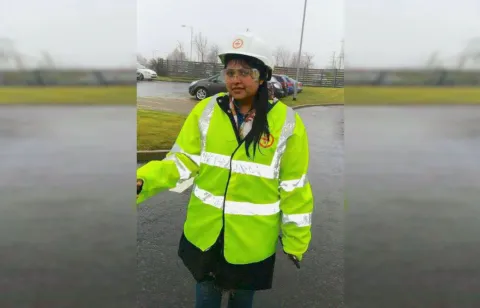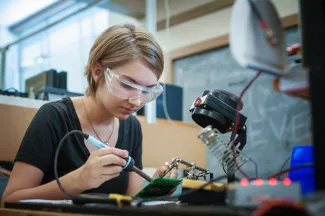"Remember that this is not just a degree, it is a once-in-a-lifetime opportunity to enhance your skills and leadership qualities, and can help you to choose your future career."

Rakiba Rayhana
- Degree:
- Doctor of Philosophy
- Grad year: 2020
- Program:
- Campus: Okanagan
I am Rakiba Rayhana, a PhD student in Electrical Engineering at the University of British Columbia, Okanagan campus. I am working with condition assessment and prognostics for the water infrastructure in Canada. My aim is to develop an efficient and a cost-effective solution to enhance the condition assessment of water pipelines to prevent any unanticipated disasters and to ensure safe delivery of water to households.
Why did you choose to go into your field of study at UBC?
I chose UBC to pursue my higher studies in condition assessment and prognostics because UBC is one of the few universities in Canada which has the facilities to work in this area. UBC has cutting-edge and world-class facilities for aspiring researchers. Condition assessment is not a new research area, but it is not a popular field in many other universities of Canada. UBC provides wide flexibility in the research area and allows students to solve real-world problems by collaborating with different industry partners. In short, the unique research opportunities that are offered by UBC motivated me to choose UBC to pursue my PhD degree.
What has made your time at UBC memorable?
There are countless memories I have at UBC, but amongst them working with the National Research Council of Canada (NRC) for a short-term project was really memorable. I had a chance to work with the Advanced Photonics Research group at NRC, where I was working as a part-time student researcher. This research experience not only provided me a platform to know about the food industry of Canada, but it also shaped and helped me a lot to grow as an individual researcher.
What has been your most valuable non-academic experience studying at UBC?
I was a part of numerous online volunteering activities while I was studying at UBC. I also volunteered for the EGSS program at the UBC Okanagan campus. This volunteering experience was very unique and memorable as it helped me to improve my networking skills and at the same time helped me to meet some wonderful friends.
Tell us about your experience in your program. What have you learned that is most valuable?
My experience of doing a PhD in Electrical Engineering has been an incredible one. I had a chance to learn, grow and enhance my skills in different aspects of life. The most valuable thing that I have learned so far is time management and self-discipline. Getting a PhD degree definitely requires hard work and patience but managing your time, which to me is balancing your life with an equal amount of responsibilities and priorities, is something that this degree has taught me so far.
How are you applying the skills you learned through your studies at UBC?
I believe time management is something that is not limited to a particular field or profession. It is vital to manage your personal life as well. I believe this degree has helped me to know myself more and helped me to be more organized as a person. There are times when project completion, a deadline for a report, a paper submission or a product delivery for industry partner seems very difficult to meet. To tackle these problems, the development of efficient time management skills is essential. It is a life-long skill which plays an important role for any profession around the world.
What advice would you give a student entering your degree program?
Believe in yourself, you can do it. This is what I would like to say for future graduate students in my program. Of course, the journey of completing a degree comes with a lot of highs and lows. There will be days full of clouds and there will be days with sunshine as well. Therefore, believe in yourself and try to surround yourself with positivity. Remember that this is not just a degree, it is a once-in-a-lifetime opportunity to enhance your skills and leadership qualities, and can help you to choose your future career.
How do you feel your degree has benefitted you compared to a different field of study?
I always wanted to be in the field of Electrical Engineering. So, I cannot think what it would have been if I was not studying this. The only thing I can say is that if I was not studying Electrical Engineering, I would probably not know my true potential and may never reach the goal of becoming a researcher. Therefore, this degree has played an important role in choosing my career as a researcher.
Where do you find your inspiration?
My biggest inspiration is my parents. They were always very supportive of my higher studies and they have always motivated me to push myself harder to excel in life. Apart from my family, my friends were also very supportive. I am very grateful for the countless prayers and support that I have received from them.
What are your immediate and/or long-term plans for the future?
The immediate plan is to continue the research and complete the degree as soon as possible. For future plans, I intend to teach in universities and continue research work.
What are your future plans to make a difference in our world?
I have decided to immerse myself in academia. I want to teach and continue my research work in universities, especially in my home country where there are fewer opportunities for students to conduct quality research. After I obtain my degree, I would like to share my knowledge of research with students so that our country starts producing quality research papers and scholars. The impact may not be measured in the short-term but in the long run, it will definitely make a difference in our world.

